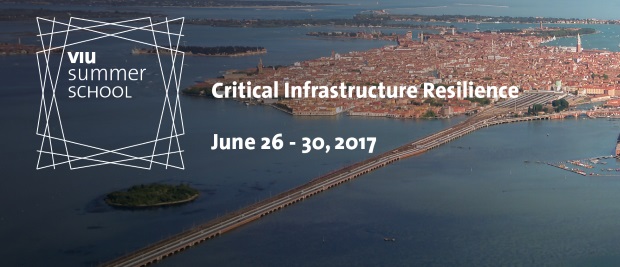|

Duration and period:
5 days, June 26 – 30, 2017
Location:
Venice International University, Island of San Servolo, Venice (Italy).
In its first edition, the summer school on Critical Infrastructure Resilience (CIR) brings together academics and professional experts to discuss an emerging topic with a pragmatic and scientific approach.
The VIU School is organized in cooperation with University of Tor Vergata, Waseda University and Lund University.
Course Description
From the neighborhood we live in to global production supply chains, we live in an increasingly connected world, where we often use our infrastructure for multiple purposes. Our society becomes more efficient but also increasingly interdependent and complex. So the loss of performance or disruption in some key points can have a cascading impact throughout the system. We refer to these key points as critical infrastructure: “An asset, system or part thereof which is essential for the maintenance of vital societal functions, health, safety, security, economic or social well-being of people, and the disruption or destruction of which would have a significant impact”. This course explains how critical infrastructure works and fails; its cascading impact from local to global, and the strategies to use to build resilience against e.g. extreme events and climate change.
To give some examples: a local riot in Delhi, India in February disrupted a key water distribution canal, cutting off water supply to 17 million residents. The 2011 Tohoku Earthquake that hit Japan disrupted many automotive factories and caused rippling impact, like the General Motors truck plant in Louisiana that had to shut down temporarily for lack of Japanese-made parts. The 2010 volcanic eruption over Iceland grounded commercial flights over 20 countries, affecting 10 million passengers. These examples can be found across all fields and used at different scales, from social interactions to lifeline utilities to trade and commerce.
Critical infrastructure resilience has its roots in system theory and complexity theory, with applications ranging from engineering performance design to ecosystem management. We use the broader definition “the capacity of a system to absorb disturbance and re-organize while undergoing change so as to still retain essentially the same function, structure, identity, and feedbacks.” This definition means that we consider 2 types of impact: an extreme event (i.e. terrorist attack or a natural disaster) that can disrupt the core function of an infrastructure or, a change in operating conditions (such as different mean temperature or precipitation pattern due to climate change) that can affect the performance and competitiveness of the infrastructure.
The course aims to provide a solid understanding of critical infrastructure and its role for the global, interconnected world we live in and to frame it within the concept of resilience. The course consists of a mix of theoretical knowledge, case studies and hands-on exercises. The city of Venice will be used as a laboratory and students will learn first hand how to identify a critical infrastructure, assess its risk, develop resilience strategies and devise ways to apply them. Students will work on their field of interest and contribute to a multi-disciplinary teamwork.
Topics
- Definition and role of critical infrastructure
- Cascading impacts and methodology to rank criticality
- Risk assessment methods and ways to develop scenarios
- Infrastructure systems and asset management
- Risk management strategies
- Connecting the dots with the infrastructure life cycle
- Case Study: Strategic thinking within the EU
- Applied work: Identification of critical infrastructure in Venice
- Applied work: Risk assessment and prioritization
- Applied work: Elaboration of resilience strategies
Methodology
The 5-day course consists of 10 modules (as listed above), offering a mix of theoretical knowledge, experience sharing and applied work in the city of Venice. Students will follow lectures in the classroom and go out in the city in teams for each of the 3 applied work sessions to collect data, identify assets they judge critical and apply the techniques and tools shared in class.
Learning outcomes of the program
At the end of the course, students will be familiar with concepts such as critical infrastructure, resilience, cascading impact, and various risk strategies. The course will also provide practical tools and methods on how to: identify critical infrastructure and prioritize them, conduct basic risk assessment and develop scenarios, and elaborate resilience strategies.
Target
Graduate students and working professionals from any university, research institute, or other organization (private companies, government agencies, NGOs) with an interest in critical infrastructure issues and ability to read and write fluently in English. Advanced undergraduates will also be considered.
Faculty:
Erdem Ergin, University of Tor Vergata/ World Bank (Coordinator)
Tomoya Shibayama, Waseda University
Jonas Johansson, Lund University
Henrik Hassel, Lund University
Gaetano Vivo, European Commission
Fees
Students of VIU member universities: € 300 incl. VAT.
Students of other universities/professionals: € 600 incl. VAT.
The fees will cover tuition, course materials, accommodation in multiple rooms at the VIU campus, lunches in the VIU cafeteria and social events.
Student participants will be responsible for covering their own travel expenses to and from Venice and local transportation.
Credits
Number of ECTS credits allocated: 2
A Certificate of attendance will be issued at the end of the course.
Applications
The Program will admit 25 student participants.
Online application form available soon on the VIU website.
Applicants must submit the application form, a letter of motivation – which should include a brief description of the candidate’s research interests, a curriculum vitae and a photo.
Deadline for submissions: March 24, 2017; admitted candidates will be notified by April 3, 2017.
For further information: This e-mail address is being protected from spambots. You need JavaScript enabled to view it

Picture by Didier Descouens (Own work), CC BY-SA 4.0
|





